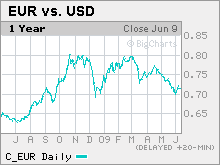Dollar falls on upbeat data, debt concerns
Euro and pound rise along with improved risk appetite.
NEW YORK (Reuters) -- The dollar fell broadly Thursday as improved U.S. unemployment and retail sales data boosted hopes of economic recovery and reduced safe-haven demand for the greenback.
The euro hit a session high near $1.41 and the price of oil climbed further above $70 a barrel, lifting commodity-linked currencies such as the Australian dollar.
Data showing fewer Americans filed for first-time jobless benefits last week boosted hopes of recovery. U.S. retail sales also rose in May, though traders said the data was misleading because much of the gain was tied to higher gasoline prices.
But a G8 source told Reuters the International Monetary Fund had raised global growth estimates for 2010 to 2.4%, from 1.9% in April.
"What we are seeing is a continuation of rising risk appetite. Equities are having a decent day, commodities are doing quite well, and that's weighing on the dollar," said George Davis, a strategist at RBC Capital Markets in Toronto.
The euro was last trading at $1.4080, near a session peak of $1.4091. Davis said the next technical barrier comes in around $1.4128, giving the euro room to rise further.
The dollar fell 0.3% to 97.85 yen a poll showing rising U.K. inflation expectations pushed the pound up 1.1% to $1.6533. The euro fell to 84.99 pence, its lowest level against the pound this year.
The Australian dollar jumped 2% to $0.8180 and the New Zealand dollar soared 2.5% to $0.6455 after the central bank left interest rates unchanged.
The dollar was also dented by concern about a record U.S. budget deficit and a steady rise in long-dated U.S. government bond yields that could make it more costly to finance.
On Wednesday, yields on the benchmark 10-year Treasury hit 4%, and traders said a sale of $11 billion in 30-year bonds this afternoon was important.
The U.S. Treasury intends to issue some $2 trillion of fresh debt in 2009 alone, and while demand for short-dated debt has remained sturdy of late, analysts say foreign investors worried about higher deficits and inflation may shy away from tying up their money for 10 to 30 years.
"That adds a bit of risk to the market today, and with the dollar on the ropes already, it could fall further if the auction doesn't go well," Davis said.
Russia's central bank said this week it would divert some of its reserves away from U.S. Treasurys, a move that may be highlighted when the world's largest emerging countries meet in Moscow next week.
"It is quite obvious that people are worried about the U.S. fiscal deficit. The amount of capital being demanded by the U.S. Treasury for its funding programs is huge," Bank of New York Mellon currency strategist Neil Mellor said. ![]()



